2011
Audrey Yank, Renewable Energy Intern 2011 - 2012
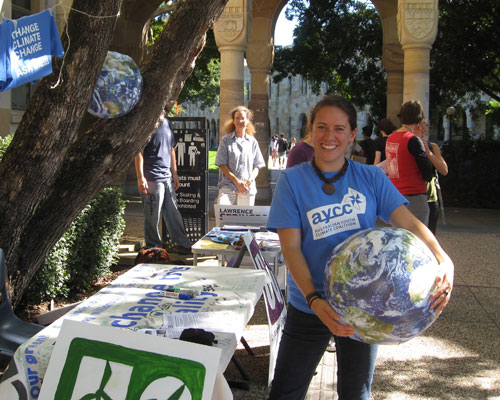 Background Bio:
Background Bio:
Born in Gatineau, I have been involved in environmental causes since a young age. I like to describe myself as a cheerful and smiley francophone! I first witnessed the impact of climate change on populations of the global south during an international development internship in Niger, with Québec sans frontières in 2007. Since then, I have been more devoted towards climate action. In 2009, as part of my Bioresource Engineering Degree, I was granted an opportunity to carry out my undergrad research project related to alternative energy sources in Benin.
Through my various school and community involvements, I have developed a real desire to make a difference. Last year, I was part of the Canadian Youth Delegation that attended the United-Nations Conference on Climate Change in Mexico, to represent the voice and views of the Canadian youth at these international climate negotiations. In the winter 2011, I had the incredible opportunity to learn more about our Earth’s system and to develop a new perspective on climate change with the Students of Ice research expedition to Antarctica. I believe that understanding and experiencing are key drivers for my dedication to international development and climate action.
I am now looking forward to my involvement at a professional level with REAP-Canada as a renewable energy intern in The Gambia!
Education:
B.Eng. – Bioresource Engineering, McGill UniversityHost Country:
The Gambia
Expérience de Stage:
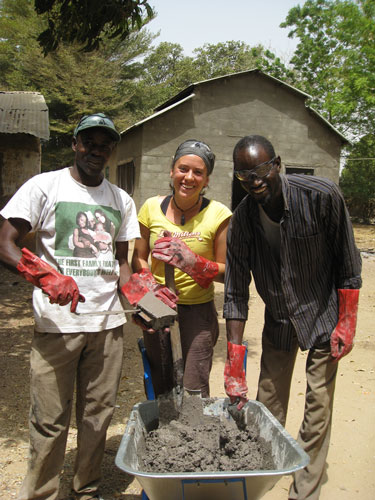 As-Salamu Alaykum! Que la paix soit avec vous! Une fois, deux, trois fois, et hop, je viens de marcher 200 mètres à travers du village mais j’ai quitté la maison il y a 2 heures. Mais que c’est-il passé? Je me suis fais prendre encore une fois. En Gambie, l’importance de l’As-Salamu Alaykum et des salutations subséquentes est à l’image d’un peuple chaleureux à l’hospitalité indescriptible et au respect intégral.
As-Salamu Alaykum! Que la paix soit avec vous! Une fois, deux, trois fois, et hop, je viens de marcher 200 mètres à travers du village mais j’ai quitté la maison il y a 2 heures. Mais que c’est-il passé? Je me suis fais prendre encore une fois. En Gambie, l’importance de l’As-Salamu Alaykum et des salutations subséquentes est à l’image d’un peuple chaleureux à l’hospitalité indescriptible et au respect intégral.
Après quelques mois à Njawara, je faisais maintenant partie de la vie du village. Ana Awa? Ou est Awa? Mang fi! Je suis là! Il y aura le baptême du petit nouveau des Jallow, n’y manque pas! Avec mes robes africaines colorées, quelques enfants aux doigts, le soleil éclatant et les manguiers bien chargés, la vie est belle et il y a peu de soucis à se faire. Les journées s’écoulent au rythme des rencontres, du vent chaud et des tasses de thé.
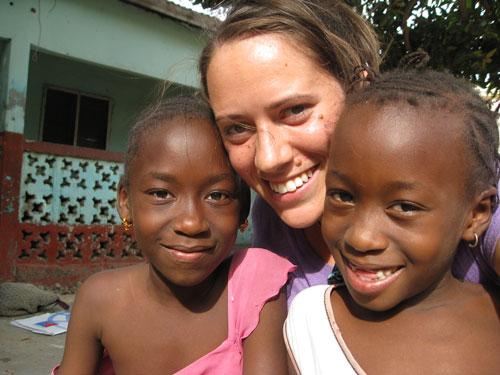 Mais la Gambie est aussi à mes oreilles un son de défi, de découvertes et de surpassement de soi. Au départ, je pouvais être assise des heures à ne pas comprendre réellement ce qui se passait autour de moi, et maintenant, c’est tout juste si les mots me viennent en tête plus rapidement en Wolof. Les gens de Njawara étaient des inconnus, ils sont devenus des amis. Un projet avec le partenaire local NATC s’est mis en branle, nous avons eu du pain sur la planche. J’ai versés des larmes en quittant des êtres chers au Québec, j’en ai fait autant en quittant la Gambie.
Mais la Gambie est aussi à mes oreilles un son de défi, de découvertes et de surpassement de soi. Au départ, je pouvais être assise des heures à ne pas comprendre réellement ce qui se passait autour de moi, et maintenant, c’est tout juste si les mots me viennent en tête plus rapidement en Wolof. Les gens de Njawara étaient des inconnus, ils sont devenus des amis. Un projet avec le partenaire local NATC s’est mis en branle, nous avons eu du pain sur la planche. J’ai versés des larmes en quittant des êtres chers au Québec, j’en ai fait autant en quittant la Gambie.
Expérience professionnelle, personnelle et culturelle comme je n’aurai jamais pu l’imaginer, la Gambie m’en a mis plein la vie malgré cette 3e visite sur le continent Africain. Cette fois, les mains dans l’argile et les idées en 5e vitesse, j’ai participé à la conception et l’implantation dans 35 villages d’un nouveau foyer amélioré, le No-flaye, qui diminue le taux fulgurant du déboisement dans la région. J’ai eu la chance de travailler en première ligne avec les communautés, les groupements de femmes, les ouvriers d’ateliers.
La nourriture bien riche et gouteuse me manque, les enfants qui crient mon nom aussi. J’ai la tête remplie des sons des rues animée, des images des animaux qui déambulent, des odeurs, des couleurs. Je pense à tous ceux qui font celle que je suis maintenant. Alors, on se dit à quand? Be si kanaam! A tout à l’heure!
Sitelle Cheskey, Ecological Agriculture Intern 2011-2012
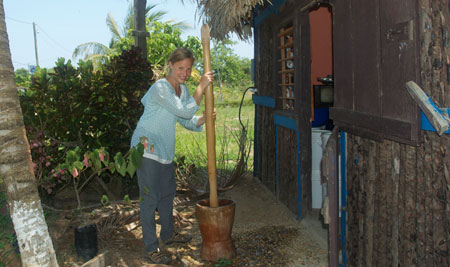 Background Bio:
Background Bio:
I grew up in a tight community in a family that cared deeply about environmental issues. This has provided me with a strong backdrop, and ever since, communities and the environment have remained two important areas of interest for me. I am perpetually involved in community programs, and spend at least a few weeks each summer in the wilderness, immersing myself in nature.
Over time, my interests began to focus on the importance of food and the environment at the level of communities. I have been a food security advocate since high school (although I did not know it at the time), implementing my school’s first inclusive breakfast program in order to tackle issues of access to food. More recently, I have become engaged in Toronto’s food security and food sovereignty movement, through community gardens, collective and community kitchen development, and other activities in both a professional and a volunteer capacity. This past year, I expanded my interest in food security to issues faced by aboriginal communities in Belize. That experience, coupled with a recent trip through Central America reaffirmed my interest to face issues of inequality.
It’s difficult to distinguish my background from my education because, for me, they are inseparable aspects of who I am. I did a long-winded multi-disciplinary degree at the University of Toronto, taking courses in over a dozen departments in order to obtain the academic background I wanted. Essentially, I focused on the area where the environment and other determinants affect health and food/nutrition at the global level. With my degree finally complete, I am really excited to participate in change to improve agricultural conditions and to support community development efforts in rural Senegal with REAP.
Education:
B.Sc. Global Health, Nutritional Sciences, and Environmental Studies; University of TorontoHost Country:
Sénégal
Internship Experience:
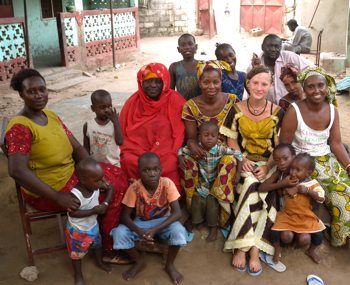 Since elementary school when I first read Le Petit Prince, I always wanted to see a real baobab tree. When I flew into Banjul, I couldn’t suppress how excited I was to be flying down the coast of West Africa, towards what I expected would be an incredible work and personal experience and also where I would catch a glimpse of my very first baobab tree. Neither disappointed me.
Since elementary school when I first read Le Petit Prince, I always wanted to see a real baobab tree. When I flew into Banjul, I couldn’t suppress how excited I was to be flying down the coast of West Africa, towards what I expected would be an incredible work and personal experience and also where I would catch a glimpse of my very first baobab tree. Neither disappointed me.
It’s difficult to capture exactly what my internship experience brought me. Although I set out as an ecological agriculture intern, I was quickly required to change hats and support the CLEAR improved stove project. In between my CLEAR responsibilities, I honed my virus fighting (of the computer variety), Microsoft teaching, and network setup skills. I also grew close to an entire village, tutored students into the night with the help of the flashlight on my trusty handheld Nokia, and experienced the incredible hospitality of Gambian and Senegalese people.
I also waited, longingly, for the mangoes to ripen. Many times over I asked local friends when the mangoes were usually ready. “Maybe May,” they would answer. I was set to leave before then, and hoped that a few would ripen faster. I even picked an especially big one and put it inside a bag in the hopes it would ripen earlier. Unfortunately, something else got to it first.
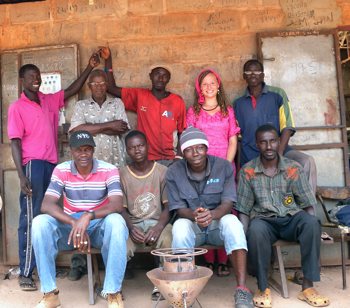
Due to the rather fast change in direction into stoves, though, I was fortunate enough to have my internship extended. This, among many other things, meant that I did meet the ripe mangoes and perhaps even over-eat them. It also meant that I participated in the implementation of a big stove project, finding myself taking on responsibilities and learning skills that I had never imagined. Shifting between sourcing equipment ranging from masons’ trowels to massive drill presses with preferably at least one HP, financial tracking, workplan development, and whatever else needed doing, I was kept more than busy. I had the privilege of working with a diverse group of people: an incredibly hard-working team, masons, welder-men (because, other than Awa, my intern counterpart, I never saw another women working on metal there), women’s groups, and many communities. I worked in almost 40 villages in the North Bank Region of The Gambia and on occasion in Senegal. Despite this wide distribution, I was always unquestionably fed and my thirst always quenched in every place I set foot; often I could not eat enough to satisfy them.
It would be unfair for me to describe my experiences without mentioning the adventures of learning to live in a different culture. Learning Wolof was one of the most interesting and rewarding experiences I have had. It kind of crept up on me, without my realizing. It wasn’t until I started to have real female friends that I realized I had started to get a good grasp of the language, because many of the women could not speak English or French. Now I keep my ear open every time I see someone who might look West African, hoping to catch them by surprise by speaking to them in Wolof.
I cannot thank everyone enough for everything I learned with them and from them. Having reached the end of my internship, I am hopeful that it is just the beginning of something I will continue to weave into my life well into the future.
Maxime Ouellet-Payeur, Renewable Energy Intern 2011-2012
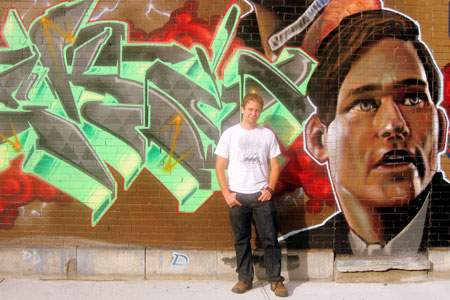 Background Bio:
Background Bio:
I grew up in Hochelaga-Maisonneuve, in Montreal. This district is well-known for high poverty rates, but people often overlook its deep social roots and the web of organizations working there to support families. I remember looking at these events with a child's eye and what hit me most was the way social groups helped in solving problems.
My family came from an agricultural background before moving to Montreal. I always get the feeling this might be one of the reasons why I became interested in food engineering and specialized in this field at McGill University. I also got involved with many students at McGill's Macdonald campus. I served them last year as president of the faculty's students society. Among other things, we organized a fundraiser for the Canadian Cancer Society and supported a student-run agricultural project.
One of the upcoming challenges will be to find the means to provide better food to a growing population. This population is expected to come mostly from developing countries who are already facing that issue. Words can hardly express how happy I am to join REAP's initiatives in Sénégal and tackle these challenges!
Education:
B.Eng. – Bioresource Engineering, McGill UniversityHost Country:
Sénégal
Internship Experience:
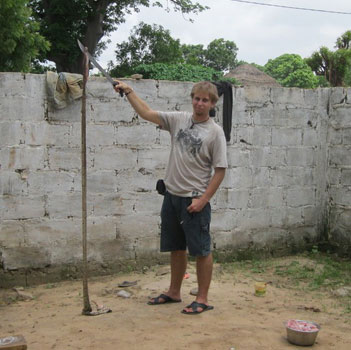 It's 11 AM in Wack Ngouna when I receive a phone call from my brother, Omar.
It's 11 AM in Wack Ngouna when I receive a phone call from my brother, Omar.
“Hey Alioun (me), you gotta come and see this. The Haidaras just caught a boa constrictor! I'll be waiting for you at my usual spot on the main road.” Of course, this isn't your typical scene, even in Wack Ngouna, Sénégal, and when I tell my bosses I have to leave work for 15 minutes to go and see this, everybody wants to accompany me. Snakes and humans don't get along, to say the least, but everybody wants to see them once we are pretty certain they are harmless.
It's hard to really pinpoint one single element of your life in Africa that you will remember all your life. You live there, quoi! It's not like there is one item, a smell or a way of living that you'll remember more than another. Every breath you take and every attaya sip you drink makes you blend in more and more in this West African culture. It just naturally crawls into you, if you are kind enough to let it. You feel it even more when you get back in Québec.
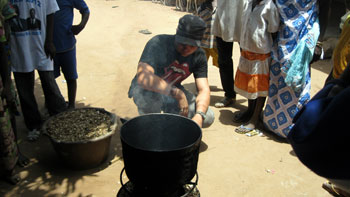 As an experience, one could say it was unique. I was to work on a new stove distribution project in the Gambia, then join a new overseas partner in Sénégal to set-up a new workshop that had never made improved cookstoves in the past. Lots of new things, one could say. The experience was awesome because everywhere we went, we met dedicated people ready to work for their community, first and foremost. In the end, I had to leave Wack Ngouna with a heart marked forever by the téranga (friendship – Sénégal's way of life) and my head filled with the upcoming challenge from this emerging organisation which is the Wack Ngouna CLCOP.
As an experience, one could say it was unique. I was to work on a new stove distribution project in the Gambia, then join a new overseas partner in Sénégal to set-up a new workshop that had never made improved cookstoves in the past. Lots of new things, one could say. The experience was awesome because everywhere we went, we met dedicated people ready to work for their community, first and foremost. In the end, I had to leave Wack Ngouna with a heart marked forever by the téranga (friendship – Sénégal's way of life) and my head filled with the upcoming challenge from this emerging organisation which is the Wack Ngouna CLCOP.
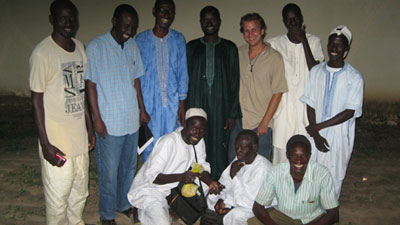 In 6 months, the office appearance changed completely. From two offices (one with electricity), we now have 3 freshly equipped offices and a large meeting room and a team of relays who show up on a daily basis to receive their tasks. When we arrived, things were already building up to reach this objective, but it felt good to see things unfold.
In 6 months, the office appearance changed completely. From two offices (one with electricity), we now have 3 freshly equipped offices and a large meeting room and a team of relays who show up on a daily basis to receive their tasks. When we arrived, things were already building up to reach this objective, but it felt good to see things unfold.
So it is with a bitter heart that I had to leave Wack Ngouna. One cannot tell what he will remember the most from a 6-month experience in West Africa, least of all in Sénégal, but one can be sure everything he has experienced there will stay with him until the end.
Zachary Daly, Ecological Agriculture Intern 2012
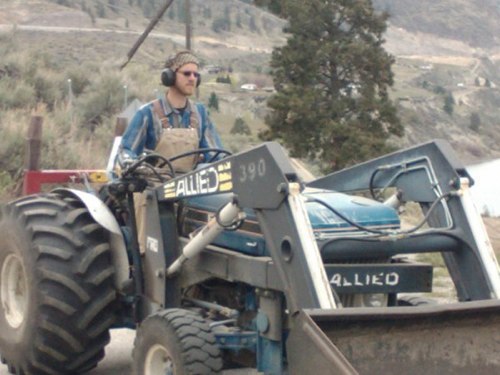 Background Bio:
Background Bio:
Growing up, I moved around a lot, living in Ontario, Nova Scotia and The Netherlands, before settling in New York. I had little exposure to agriculture in the part of New York I was in, but my family cared deeply about environmental and social justice issues and passed this passion on to me. Summers were usually spent on cross country camping trips that would last weeks or months. After graduating from high school I decided to pursue a career in mathematics and physics; however, after my second year of study I realized that I wanted something different from life, something that would allow me to work outside with my hands and something which would fit into my desire to work on environmental and social issues. After much thought, I decided that the answer was agriculture.
It did not take long for me to realize that I had made the right choice as I was able to pursue courses in crop science, agricultural economics, and soil science. As part of my education I did an exchange semester in The Netherlands, where I was able to study the global food system and rural livelihoods. Since graduating, I have focused on acquiring hands-on agricultural experience, doing one season on an organic vegetable farm in Ontario, and another season on a B.C. cherry farm, as well as conducting research into the Canadian beekeeping industry.
It is exciting and humbling to think I will able to make use of my knowledge to work towards positive change in The Gambia, but I am also looking forward to all of the learning that I will be doing, both about agriculture in general, as well the broader learning that comes from learning about a new place and culture.
Education:
B.Sc. (Agr.) Honours Agriculture with a minor in Mathematics; University of Guelph
Host Country:
The Gambia
Ben Stevenson, Renewable Energy Intern 2012
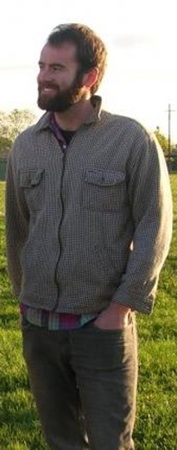 Background Bio:
Background Bio:
I like to think of myself as a “jack of all trades”. My interests and experience are broad, and I like it that way. After growing up in Ottawa (and a bit in Europe), I studied Mechanical Engineering at McMaster, which included a semester abroad in Newcastle, Australia. Following my degree I got a job as a project engineer with SolarWall in Toronto, working on solar air heating applications, along with some combined PV / thermal projects. That job took me across North America, including Alaska, and also over to France and Spain. All the while, I had been developing an interest in urban agriculture, trying my hand at growing some vegetables on my rooftop. With little success, I decided to get a practical farming education, and become an intern on a small off-the-grid organic farm. I absolutely loved working outdoors and learning good-food production from seed to plate. As a personal project, I built a solar oven and a solar dehydrator using scrap materials. We cooked a farm duck in the oven and it tasted delicious.
The more I learned about the current state of our food and energy systems, the more I became interested in working for an NGO. That led me to EcoSpark, where I helped create and implement an environmental education project. We developed a teacher resource on solar power, and worked with students to create environmental documentaries. It was a great combination of my continued interest in sustainability, education and film (video production has always been a hobby for me). That summer, I grew nearly all my vegetables in a community garden plot, and spent some time learning about REAP online. Their work seemed right up my alley, combining renewable energy, sustainable farming, education and more.
I’m so excited to be a part of the REAP team now, with an opportunity to apply a variety of skills and experience I’ve picked up along the way, and to learn a whole lot more in a completely different culture!
Education:
B.Eng. – Mechanical Engineering, McMaster University
Host Country:
The Gambia
Internship Experience:
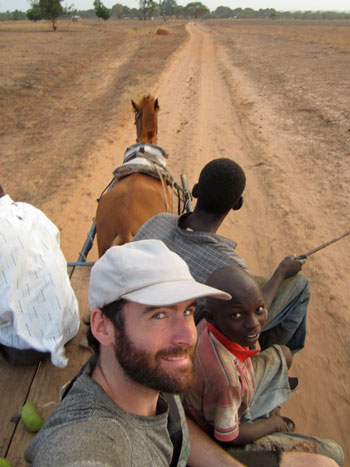 My Gambian experience was a whirlwind! The CLEAR project was in full swing when I arrived, and we were tasked with constructing thousands of Mayon and clay stoves in many regions of the country. After working with the welding shops on MTS production for a few weeks, I took on the task of building kilns for making fired bricks for the Noflay clay brick stove. Along with a local stove expert, I used Google Sketchup to help design a kiln that would soon become a reality. Buying and transporting firebricks can be expensive for villagers, so having long-lasting kilns should help to generate income and to provide a useful building material. Next, I was brought on to assist with the construction of clay stoves, which was a challenging task. Training masons, getting materials into 40+ villages, marketing and monitoring construction were not easy given the coming rainy season, when everyone prepares to go out and work in the fields.
My Gambian experience was a whirlwind! The CLEAR project was in full swing when I arrived, and we were tasked with constructing thousands of Mayon and clay stoves in many regions of the country. After working with the welding shops on MTS production for a few weeks, I took on the task of building kilns for making fired bricks for the Noflay clay brick stove. Along with a local stove expert, I used Google Sketchup to help design a kiln that would soon become a reality. Buying and transporting firebricks can be expensive for villagers, so having long-lasting kilns should help to generate income and to provide a useful building material. Next, I was brought on to assist with the construction of clay stoves, which was a challenging task. Training masons, getting materials into 40+ villages, marketing and monitoring construction were not easy given the coming rainy season, when everyone prepares to go out and work in the fields.
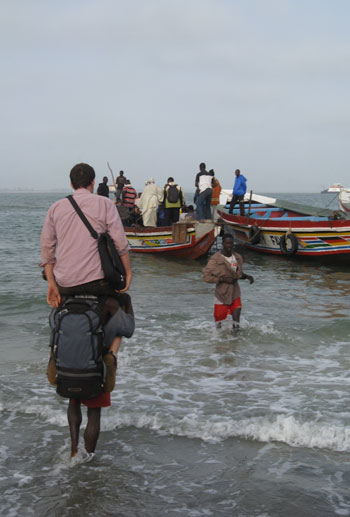 All the while, I was getting used to the frenetic modes of transportation (gelly gellys), a new language (Wolof), and adapting to a completely new culture (this was my first visit to Africa). But despite all the challenges presented, the friendly and welcoming attitude of Gambians made it easy. I will really miss the openness of the people, the impromptu conversations that happen on the street, the constant invitation to join whomever was having a meal, the open doors of the villagers who are happy for a visit any time, and of course, the children who would walk alongside you, unaware of the concept of "strangers".
All the while, I was getting used to the frenetic modes of transportation (gelly gellys), a new language (Wolof), and adapting to a completely new culture (this was my first visit to Africa). But despite all the challenges presented, the friendly and welcoming attitude of Gambians made it easy. I will really miss the openness of the people, the impromptu conversations that happen on the street, the constant invitation to join whomever was having a meal, the open doors of the villagers who are happy for a visit any time, and of course, the children who would walk alongside you, unaware of the concept of "strangers".
It was exciting to meet women in the villages that saved more than half their fuelwood by using their improved cookstoves. It goes to show that fuel efficiency can make an instant economic impact for families in the area. And in time, I hope that efficient stoves will become the norm, helping to reduce the deforestation happening in West Africa. In just one or two generations, lush forests that once contained all sorts of wildlife now are becoming deserts.
As they say in Gambia, "It's NOT easy". But beyond the challenges of life there, a rich culture and an ethos of sharing taught me a lot about life.
Denika Piggott, Ecological Agriculture Intern 2012
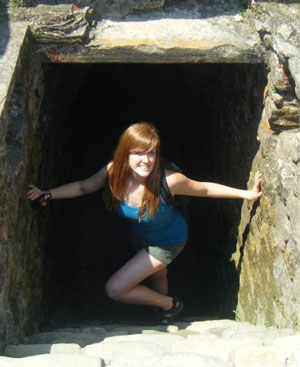 Background Bio:
Background Bio:
My family has always inspired me to change my world – by the way they’ve changed theirs. This inspiration is deep within the roots of my family tree as there has always had a strong awareness of world agriculture and for helping others within my family. My Grandfather donates land to the Canadian Foodgrains Bank to help people in need, my Grandmother was actively involved with overseas missions that our church sponsored and my Great Aunt Aldene also participated in missionary work as a nurse.
Growing up in a rural community, in an active farming family, I have always been a hands-on-learning oriented person. From childhood, my farming background gave me a hard-work ethic and a passion for the environment. After high school I transferred that passion to Sir Sandford Fleming College where I completed a three year Environmental Technology Diploma. Then I went on to complete a Bachelor of Environmental and Resource Sciences Degree at Trent University. This is where I realized my life passion lies in sustainable agriculture, specifically, food security issues and climate change mitigation strategies. Through my undergraduate thesis, I traveled to the Yucatan Peninsula, Mexico where I conducted an in-field experimental trial using Biochar as a climate change mitigation and soil amendment strategy. This experience sparked my interest with international agriculture and food security issues. Following University I spent a full agricultural season on a small farm where I grew, cultivated and produced a wide range of fruits and vegetables for local farmers markets.
My second passion is travel. I’ve travelled throughout Canada and the world. I’m an avid camper, skier and I’ve participated in two school exchanges. I love meeting new people, immersing myself in new cultures and diversifying my knowledge of the world. I am a very outgoing, enthusiastic and positive person who loves getting her hands dirty! These traits have led me into many amazing adventures throughout my life. This incredible opportunity with REAP Canada will add a tremendous wealth of knowledge and life experience to my portfolio. I’m very excited to start my next adventure with the REAP team in Gambia helping others to develop sustainable agriculture practices and techniques.
Education:
Environmental Technician/Technologist Diploma, Sir Sandford Fleming College
B.Sc. Hon. Environmental and Resource Science, Emphasis in Food and Agriculture; Trent University
Host Country:
The Gambia
Internship Experience:
My international intern experience in West Africa was full of personal growth, exploration and amazement. Living and working in rural villages across Northern Gambia was challenging but extremely rewarding. I learned the foundation of partnership relations within the field of International Development while working on the CLEAR innovative stove project. Teaming up alongside project staff, we tackled stove construction, distribution and collections within villages across the North Bank. I had the privilege of attending several stove demonstrations, stove construction trainings and community meetings. Further on in my internship, I worked on the initial research and preparation for the start up of the Senegambia Agroecological Village (SAEV) Project. One of my favourite personal activities was conducting a thorough summary of fruit tree varieties available within Gambia that could be potentially introduced into our project villages. This involved me searching out fruit farms where trees could be sourced and trying many delicious varieties of fruits including oranges, mandarins, grapefruits, mangos, bananas, lemons, watermelons and coconuts. I even got to try some exotic fruits such as guava, papaya, custard apple, cashew apple, avacado (pear), star fruit (carambola), kaba and kola nut. There are definitely benefits for being placed in Gambia over the rainy season.
However, it was not just the work experience that made this internship amazing, but the cross-cultural integration which made this adventure quite incredible. Learning a whole new way of life including a new language (woolof) was very challenging and at times even frustrating but this part contributed to my personal growth the most. Through my internship, I was adopted into several families, made some life-long friends and discovered a whole new way to look at the world.
The family and friends I made during my stay in the Gambia are those who contributed the most to this rewarding intern experience. I cannot thank you enough for your generosity, patience, support, and most of all your unconditional love. There is something so deep and magical about the Gambia that has stolen a part of my heart forever.




